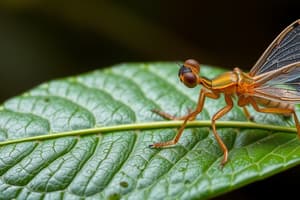Podcast
Questions and Answers
What is the primary focus of biochemistry?
What is the primary focus of biochemistry?
- The classification of organisms
- The chemical processes within living organisms (correct)
- The structure of biological molecules
- The immune response to pathogens
Which branch of biology investigates the processes from fertilization to adulthood?
Which branch of biology investigates the processes from fertilization to adulthood?
- Physiology
- Developmental biology (correct)
- Anatomy
- Microbiology
What aspect does physiology study in living organisms?
What aspect does physiology study in living organisms?
- The genetic makeup of organisms
- The characteristics of microscopic organisms
- The functions at various levels of organization (correct)
- The classification of species
What does immunology primarily focus on?
What does immunology primarily focus on?
What is one of the implications of biological research?
What is one of the implications of biological research?
Which of the following is NOT a characteristic of living organisms?
Which of the following is NOT a characteristic of living organisms?
What type of cells lack a nucleus and membrane-bound organelles?
What type of cells lack a nucleus and membrane-bound organelles?
What process leads to the adaptation and diversity of life on Earth?
What process leads to the adaptation and diversity of life on Earth?
What aspect of cell biology involves the study of organelles?
What aspect of cell biology involves the study of organelles?
Which of the following disciplines does NOT fall under the umbrella of biology?
Which of the following disciplines does NOT fall under the umbrella of biology?
Which process involves the transmission of genetic information from one generation to the next?
Which process involves the transmission of genetic information from one generation to the next?
Which core concept of biology is concerned with the features of living organisms adapting to their environment?
Which core concept of biology is concerned with the features of living organisms adapting to their environment?
Flashcards
What is Taxonomy?
What is Taxonomy?
The science of classifying and naming organisms.
What is Biochemistry?
What is Biochemistry?
The study of the chemical processes within and relating to living organisms.
What is Physiology?
What is Physiology?
The study of how living organisms function.
What is Biotechnology?
What is Biotechnology?
Signup and view all the flashcards
What does Developmental Biology study?
What does Developmental Biology study?
Signup and view all the flashcards
What is biology?
What is biology?
Signup and view all the flashcards
What is a cell?
What is a cell?
Signup and view all the flashcards
What is heredity?
What is heredity?
Signup and view all the flashcards
What is evolution?
What is evolution?
Signup and view all the flashcards
What is ecology?
What is ecology?
Signup and view all the flashcards
What is homeostasis?
What is homeostasis?
Signup and view all the flashcards
What are prokaryotic cells?
What are prokaryotic cells?
Signup and view all the flashcards
What are eukaryotic cells?
What are eukaryotic cells?
Signup and view all the flashcards
Study Notes
Introduction to Biology
- Biology is the scientific study of life and living organisms, including their structure, function, growth, origin, evolution, and distribution.
- It encompasses a wide range of specialized disciplines, including botany, zoology, microbiology, and genetics.
- Core concepts in biology include evolution, genetics, cell biology, and ecology.
Characteristics of Living Organisms
- Living organisms share several key characteristics:
- Organization: Composed of one or more cells.
- Metabolism: They obtain and utilize energy to maintain themselves.
- Growth and Development: Show consistent growth patterns and developmental processes.
- Adaptation: Organisms adjust to their environment over time.
- Response to Stimuli: React to changes in their surroundings.
- Reproduction: Produce offspring, either sexually or asexually.
- Homeostasis: Maintain relatively constant internal conditions.
Basic Units of Life
- Cells are the fundamental units of life.
- Prokaryotic cells lack a nucleus and membrane-bound organelles (bacteria and archaea).
- Eukaryotic cells contain a nucleus and membrane-bound organelles (plants, animals, fungi, protists).
Evolution
- Evolution is the process of change in populations of organisms over time through natural selection.
- Natural selection favors traits that improve an organism's survival and reproduction.
- Evolutionary processes result in the diverse life on Earth, with species adapting to various environmental pressures.
Genetics
- Genetics studies genes, heredity, and the variation of organisms.
- Genes are segments of DNA that contain the instructions for building and operating an organism.
- Inheritance of traits is based on the transmission of genetic information from one generation to the next.
Cell Biology
- Cell biology studies the structure and function of cells.
- Cells contain various organelles and structures with specific tasks, including energy production, protein synthesis, and waste disposal.
- Understanding cellular functions is critical to grasping complex biological processes.
Ecology
- Ecology studies the relationships between organisms and their environment.
- It covers various levels of organization, from individual organisms to ecosystems.
- Ecological processes encompass competition, predation, symbiosis, and nutrient cycling.
Other Important Concepts
- Taxonomy: The science of classifying and naming organisms.
- Biochemistry: The study of chemical processes within and relating to living organisms.
- Physiology: The study of how living organisms function.
- Molecular Biology: The study of biological molecules, including DNA, RNA, and proteins.
- Immunology: The study of the immune system and its response to pathogens.
- Biotechnology: The use of living organisms or their products for technological applications.
Branches of Biology
- Anatomy studies the bodily structures of organisms.
- Developmental biology investigates growth and development from fertilization to adulthood.
- Physiology deals with the functions of organisms at different levels, from cells to ecosystems.
- Microbiology examines microscopic organisms like bacteria, viruses, and fungi.
Scope of Biology
- Biology examines phenomena from genes and molecules to ecosystems and the biosphere.
- Biology's findings affect understanding of disease, environmental issues, and human health.
- Biological research advances medicine, agriculture, and conservation.
Studying That Suits You
Use AI to generate personalized quizzes and flashcards to suit your learning preferences.




